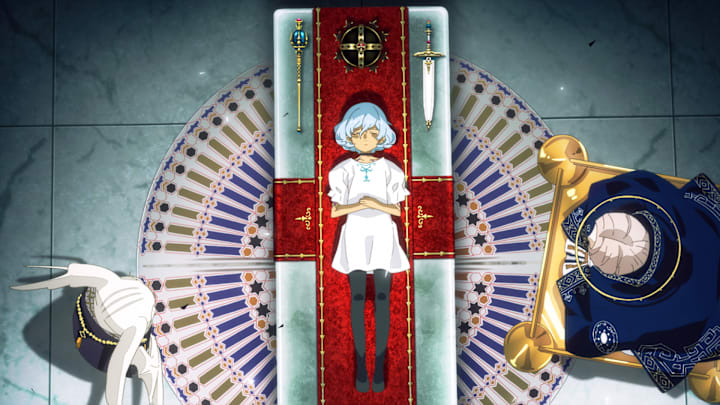Metaphor: ReFantazio review – Fantastic fantasy that makes the most of what came before

When you think about it, the tone of the Persona games has always been a bit weird. You’re a modern-day high schooler who unlocks magical powers and seeks to change the world, leading you to constantly be in life-and-death situations, and yet the characters always seem far more worried about being expelled from school or breaking curfew than falling at the hands of an unknowable god-like entity that wants to destroy them.
In Metaphor: ReFantazio’s high fantasy feudalist world there’s no such issue. When everyone is vying to become the next king, instead of being expelled from school, you’ve got to worry about your spine being expelled from your body when someone who wants to take the same throne as you goes about removing it. At least the race for prom king only occasionally devolves into a battle royale.
Safe to say, the stakes get a lot higher a lot quicker under these conditions, as you’ve barely had time to learn about this world before you’re thrown into a cutthroat contest to be its ruler, which gives everything a much more consistent tone as you can throw yourself entirely into the heroic journey without worrying about the double-life aspect.
That isn’t to say Metaphor skips over the world-building though, what it lacks in the charming “real vs magical world” dichotomy it makes up for with a strong premise for its fantasy world and strong storytelling that emmers you in it.
The world is divided into about nine different races – or “tribes” as the game calls them – and it does a very good job of showing you the complicated social fabric that exists between them all. It didn’t take long for me to understand what tribes see each other as equals and which are on the lower rungs of society. Some of that is explicitly told through dialogue, but it’s backed up by the world design showing it, with you commonly finding the socially “lesser” races in the backstreets and slums, while everyone else happily strolls through the clean streets of the capital.
The fact that there’s no secret “other world” like in Persona helps the story be a lot more direct too. Our party isn’t sneaking around trying to hide their identities from the world, they’re deliberately making as much noise as possible to try and win the support of the people, which allows for plenty of grand spectacles as you explore the world. Both in terms of crazy monsters wreaking havoc on the world and dramatic moments where you clash with your enemies in front of a massive crowd of onlookers.
The plot isn’t afraid to let loose with these big moments either. There are multiple times when it pulls twists on top of twists while also faking you out on another twist. It’s the kind of delightful nonsense that gets me excited and is exactly what I come to JRPG stories for.
When the cutscenes finish though, you’re left with gameplay that has the same broad strokes as Persona – dungeon crawling, bonding with your friends, and building your social skills – but with a bunch of unique takes on each of these things.
You have a wide array of followers to spend time with and each of them has fun little stories that let their bright personalities shine. I’ve always loved this method of storytelling as it allows us to explore these characters away from the main plot, and Metaphor’s writing is more than strong enough to do everyone justice. On top of that, the rewards and bonuses you get from deepening your bonds are great, keeping that great synergy where the life-sim and dungeon-crawling elements constantly play into each other.
Every dungeon is carefully designed – there is no random generation here – which is a big boon for the main dungeons, though it can mean that the game’s many side dungeons get a little samey. While the main dungeons are always grand concepts with fun puzzles and challenges along the way, the side dungeons are often a bunch of non-descript caves and corridors with three or four different enemy types scattered throughout. It’s not too big of a problem as most of these caves aren’t very long, just letting you gain treasure, level up, and complete side quests before tackling the main story.
When in a dungeon, you have the opportunity to battle creatures in the overworld before entering the traditional turn-based battle style – or “squad battles” as the game calls it. If you drain their guard bar without being struck yourself then you’ll ambush your opponents at the start of battle, stunning them and depleting a third of their health. That’s only if the enemy is the same or higher level than you though, as you’ll automatically defeat weaker enemies in the overworld, which gives the dungeons a much faster pace.
The squad battles are where the meat of the combat lies, running on the Turn Icons system introduced in SMTV: Vengence. By default, you start with as many as you have party members, but if you hit foes with an attack they’re weak to or a critical hit, the Turn Icon only depletes by half, letting you take an extra turn. Similarly if you dodge or block an enemy’s attack, two Turn Icons will be depleted instead of one.
It makes the game’s tougher battles very intense as you have to carefully consider how to make the most out of your limited actions, while desperately trying to stop the enemy from exploiting your weaknesses and getting extra turns of their own. What sends this complexity into overdrive though is the Archetype system.
Archetypes are your main source of abilities in the game, essentially serving as this game’s equivalent to Personas. However, unlike in those games where only the protagonist can freely switch between Personas, in Metaphor everyone in the party can study any of the Archetypes you’ve unlocked, of which there are 47 split into 14 different disciplines. Add on top of that the inherited skill system – where you can transfer over skills from other Archetypes you’ve unlocked to your current one – and you have a whole world of complexity when building your party.
The game does a good job of pacing you so you’re not overwhelmed by too many options at once. It takes about 10-15 hours before you get a full party of four, and unlocking Archetypes is tied to ranking up your bond with followers. The game uses that to make sure you’re familiar with the basics of how to build a party before giving you a steady stream of new Archetypes for the entire game.
Those in charge of the game have claimed that it’s about as long as Persona 5, but that wasn’t the case for me. I completed the game in a little over 50 hours, having done pretty much everything there is to do outside of some very grindy end-game challenges. If I were to have stuck around to do all that, and just taken my time a bit more – I read fast and am impatient when it comes to letting dialogue play out – then I could’ve seen my playtime stretching to 70+ hours.
The game is still time-limited, though unlike most Persona games, it was quite easy to do all the requests, side dungeons, and max out my follower bonds on my first playthrough. In fact, I actually had several days left over at the end of the game where there was nothing to do, which took me by surprise, as in Persona you typically have to meticulously schedule your entire life to stand any chance of seeing it all in one run. Whether you see that as a positive or negative will entirely depend on what kind of player you are, but as someone who likes seeing everything and doesn’t like second playthroughs, it gets a thumbs up from me.
Taking the Persona formula and putting it in a different setting could’ve crashed and burned, but the team behind Metaphor: ReFantazio understood exactly what needed to change to make it work. The result is a game that has a sense of familiarity in its mechanics, yet innovates in ways that make it a distinct experience. On top of that, it pulls you into this brand-new world which is expertly crafted with larger-than-life personalities that pop off the screen and make for a thrilling adventure. I don’t know if Metaphor is planned to be a one-off or the start of a new series, but either way, it’s something special.
Score: 10/10
Version tested: PC
